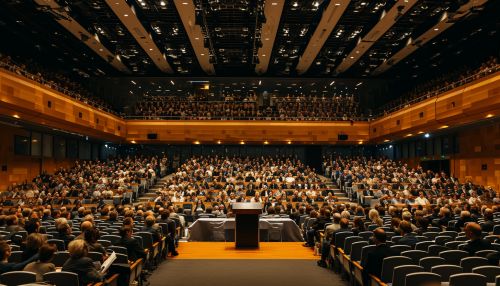Congress of People's Deputies of the Soviet Union
History
The Congress of People's Deputies of the Soviet Union was the highest body of state authority in the Soviet Union from 1989 to 1991. It was created as part of Mikhail Gorbachev's reform agenda, and was enabled by an amendment to the Soviet Constitution which had been passed in 1988.


The Congress consisted of 2,250 deputies elected in three different ways. Of these, 1,500 were elected on territorial basis by universal suffrage, 750 were elected by the Union Republics and autonomous republics, and the remaining deputies were elected by social organizations such as the Communist Party, trade unions and the Komsomol.
The Congress met for the first time in May 1989, and was seen as a forum for lively discussions and debates between different political factions. These discussions were broadcast live on Soviet television, and were watched by millions of people across the country.
Structure and Function
The Congress of People's Deputies was not a permanent institution. It was convened by its presidium, which was elected by the Congress itself. The presidium consisted of a chairman, his deputies and 23 members. The presidium was responsible for the detailed preparation and organization of the Congress' sessions.
The Congress had the power to pass laws by majority vote, and had the authority to amend the Constitution and the fundamental principles of the Soviet state. It also elected the Supreme Soviet, which was a smaller body of 542 deputies. The Supreme Soviet was in session when the Congress was not, and had similar legislative powers.
The Congress was also responsible for electing the President of the Soviet Union, and for approving the nominations of the Council of Ministers and the Supreme Court.
Significance and Impact
The creation of the Congress of People's Deputies marked a significant change in the political structure of the Soviet Union. It was seen as a move towards greater democracy and openness, and was a key part of Gorbachev's "glasnost" and "perestroika" reforms.
The Congress allowed for a greater diversity of views to be expressed within the Soviet political system, and its debates and discussions were seen as a break from the monolithic and top-down style of governance that had characterized the Soviet Union for much of its history.
However, the Congress was also seen as a forum for political infighting and factionalism, and it was often criticized for its inefficiency and inability to make decisive decisions. The Congress was also unable to prevent the dissolution of the Soviet Union, which occurred in 1991.
Dissolution and Legacy
The Congress of People's Deputies was dissolved in September 1991, following the failed August coup attempt against Gorbachev. The Congress was replaced by the Supreme Soviet, which declared itself the highest state authority in the country.
The legacy of the Congress is mixed. On one hand, it is seen as a symbol of the democratic reforms that were attempted in the late Soviet period. On the other hand, it is also seen as a symbol of the political instability and factionalism that characterized this period.
Despite its short existence, the Congress of People's Deputies had a significant impact on the political landscape of the Soviet Union, and its debates and discussions remain a key part of the historical record of this period.
